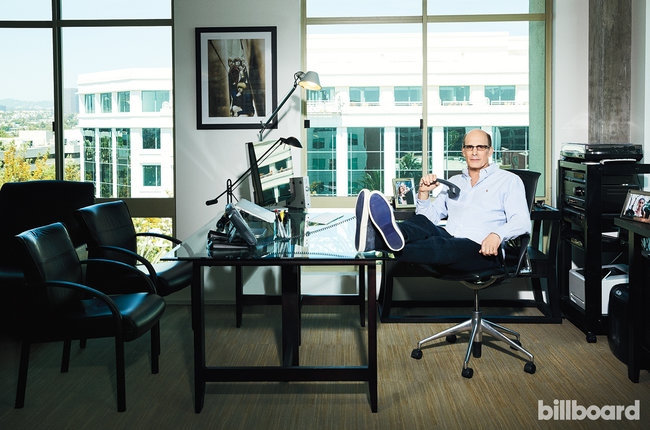The future of the music business depends, more than ever before, on the past. As recently as 2006, catalog – the industry term for albums that have been in the market for more than 18 months – accounted for just 38.1 percent of U.S. album sales, according to Nielsen Music. By last year, however, that number was up to 61.8 percent – and catalog represented 66.2 percent of overall music consumption, counting physical sales, downloads, and on-demand audio streaming. The shift can be seen in every format, but it’s most pronounced on services like Spotify and Apple Music, where catalog represents 70.4 percent of listening.
"We're in a phenomenal growth spurt," says Universal Music Enterprises president/CEO Bruce Resnikoff, 60, who has overseen the catalog division of the world's largest music company for 30 years. "The catalog business is having its biggest expansion since the CD."
Read more: Beatles Open the Vaults For 50th Anniversary of 'Sgt. Pepper's Lonely Hearts Club Band' Album
This year, UMe began overseeing Universal Music Group's catalog globally, and Resnikoff is bringing the business into the streaming era while also creating high-end physical products like the $150 six-disc 50th-anniversary edition of The Beatles' Sgt. Pepper's Lonely Hearts Club Band, which will be released May 26. "Even though people are reading books on the Kindle and the iPad, there’s a huge business at the Taschens of the world for high-end coffee table books," he says. "Physical products at the high end, and to some extent vinyl and CD, are not going away soon. It’s our job to connect with different levels of consumers."
Catalog now accounts for two-thirds of music sales. How did that happen?
Historically, the catalog business was about reissues and box sets, and getting space at retail. With streaming, it’s about how to drive people to music, and one of the most important ways we do that is with our playlisting strategy. If an artist announces a tour, if something happens on social media, we can promote music, literally, within an hour.
Last summer, President Obama put out a playlist and he included “Good Vibrations,” and we took that opportunity to link that playlist to the Beach Boys' web site and other places where fans gathered, and we promoted the song. The amount of streaming and playlist activity went up by more than a fifth. It’s not just about being proactive – now we also have to be reactive.
On May 26, Universal will release four 50th-anniversary editions of Sgt. Pepper, one of the landmark albums of the rock era.
This is not something that was taken lightly. It took a long time to make sure that everything in the package is consistent with what the record was intended to be. And there are four different ways to buy it, depending on how eager you are to dig into how the album was created.
I also understand that you’re starting an online record club.
This summer we’re launching a vinyl club, Sound of Vinyl, where we’ll connect directly with consumers via mobile, using a technology called ReplyYes. People can put in all of their information – likes, dislikes – and every day they’ll get a text offering them a vinyl record, tailored to their taste, and they can reply yes or no. It’s not opt-out like the old record clubs – you get an offer, tailored to your taste, and you can buy it if you want. There’s no obligation.
You’ve been in the catalog business for most of the time there’s been one. How has it changed?
I started out in business affairs at MCA Records in 1983, and in 1985 I was asked to start up the special markets division. At first we put out unreleased material and straight reissues, and it was a great way for record companies to monetize the assets they were sitting on. When Universal bought Polygram in 1998, we went from having a small catalog to one of the largest. What wasn’t perceived initially was the extent to which catalog would become such a big part of the business in terms of generating money to invest in new artists and new ways to create and distribute music.
The catalog business also expanded in terms of range of products offered, especially in terms of low-end hits compilations and high-priced box sets.
You’re talking about segmentation, which is a core principle behind what we do. We discovered that when we put out entry-level products at Walmart, they didn’t seem to cannibalize box sets we sold elsewhere. So we created 20th Century Masters: The Millennium Collection, a series of lower-priced greatest-hits albums, and over 20 years we’ve sold more than 75 million copies of about 400 titles in the U.S. But we never did it at the expense of higher-priced releases with better packaging. It’s not dissimilar to the book business -- books come in paperback, hardcover, and coffee table editions.
A lot of people would say you have the best job in the business.
I say this to myself every morning when I wake up. I’m not shy of that – I’m proud of it. I work every day with artists I idolized growing up. The greatest day of my life – in front of my wife, I say, "Other than getting married and having children" – was one Friday, when I went from meeting with Mick Jagger about doing the Exile on Main Street box set to Ringo Starr’s house so he could play me a new album. That was in the afternoon, so I went home and relished it – and I’ve relished it ever since.
Any other great stories about working with artists you admire?
Stevie Wonder has an air hockey table in his studio and he challenged me to a game. I half-heartedly said yes, and before I turned around he had scored three goals. I had trouble scoring, partly because he places his arm in front of the goal. But when I pointed that out, he said there were advantages I had that he didn't.
This article originally appeared in the May 27 issue of Billboard.








